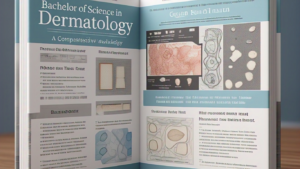Introduction
The Bachelor of Science in Dermatology is a specialised degree for those interested in skin health. It provides a deep understanding of skin conditions, treatments, and skincare techniques. This degree prepares students for careers in dermatology clinics, skincare industries, and medical research.
What is a Bachelor of Science in Dermatology?
The Bachelor of Science in Dermatology is a structured program focusing on skin health. It covers anatomy, physiology, dermatological diseases, and treatments. The course blends theoretical knowledge with practical training.
Why Choose a BSc in Dermatology & Skincare?

A BSc in Dermatology & Skincare offers many career opportunities. It is ideal for those passionate about skincare and medical science. The degree provides knowledge of skin conditions, cosmetic procedures, and dermatological treatments.
Course Structure and Duration
The Bachelor of Science in Dermatology typically lasts three to four years. It includes subjects like dermatology, skin microbiology, cosmetic dermatology, and clinical dermatology. Practical sessions enhance learning experiences.
Essential Skills You Gain
A BSc in Dermatology & Skincare helps develop essential skills like skin analysis, diagnosis, treatment planning, and skincare consultation. Students also learn about advanced dermatological procedures.
Career Opportunities
Graduates of a Bachelor of Science in Dermatology can work in dermatology clinics, hospitals, cosmetic industries, and research institutions. Some become skincare specialists or dermatology assistants.
Importance of Dermatology in Healthcare

The Bachelor of Science in Dermatology is crucial in healthcare. It helps diagnose and treat various skin conditions like acne, eczema, and psoriasis. Dermatology experts improve patients’ confidence and skin health.
Eligibility Criteria and Admission Process
To enrol in a BSc in Dermatology & Skincare, students need a background in science. Admission requirements vary by institution but usually include a high school diploma with science subjects.
Specializations in Dermatology
The Bachelor of Science in Dermatology offers specialisations like cosmetic dermatology, clinical dermatology, and dermatopathology. Students can choose their field of interest to excel in their careers.
Top Colleges Offering BSc in Dermatology & Skincare
Several universities offer a BSc in Dermatology & Skincare. Students should research accredited institutions for quality education and practical training.
Challenges in Dermatology Studies
Studying for a Bachelor of Science in Dermatology requires dedication. It involves learning complex skin conditions, medical terminology, and hands-on training. However, the career rewards are worth the effort.
Technological Advancements in Dermatology
With advancements in technology, dermatology has evolved significantly. The use of laser treatments, AI-driven skin analysis, and teledermatology has enhanced patient care. Students pursuing a BSc in Dermatology & Skincare must stay updated with these innovations.
Practical Training and Internships
A Bachelor of Science in Dermatology program includes hands-on training through internships in dermatology clinics, hospitals, and cosmetic industries. These experiences help students gain real-world skills and prepare for professional roles.
Research Opportunities in Dermatology

Students pursuing a BSc in Dermatology & Skincare can engage in research projects related to skin disorders, cosmetic product development, and innovative treatments. Research in dermatology contributes to advancements in skin health.
Salary Expectations and Job Market
The job market for dermatology graduates is growing. Salaries vary based on job roles, experience, and location. Dermatology assistants, skincare specialists, and cosmetic dermatologists have promising career prospects.
Future Scope of Dermatology
The field of dermatology is expanding with new treatment methods and technologies. Graduates of the Bachelor of Science in Dermatology can explore roles in teledermatology, cosmetic industries, and academic research.
Role of Nutrition in Skin Health
A BSc in Dermatology & Skincare also emphasises the importance of nutrition. A balanced diet rich in vitamins and minerals plays a significant role in maintaining healthy skin. Students learn how diet affects skin conditions and how to recommend suitable nutritional plans.
Dermatology and Cosmetic Industry Trends
The cosmetic dermatology industry is evolving rapidly. With new skincare products and treatments being introduced, professionals with a Bachelor of Science in Dermatology must stay updated on the latest trends and research.
Ethical Considerations in Dermatology
Dermatologists and skincare professionals must adhere to ethical guidelines when treating patients. The BSc in Dermatology & Skincare program teaches students about patient confidentiality, informed consent, and ethical responsibilities in dermatology practices.
Entrepreneurship in Dermatology
Graduates of a Bachelor of Science in Dermatology can also become entrepreneurs by starting their own skincare clinics or cosmetic brands. Understanding business management and marketing strategies is essential for success in this field.
Importance of Continuing Education
The field of dermatology is continuously evolving. Professionals with a BSc in Dermatology & Skincare must engage in ongoing learning through workshops, certifications, and advanced courses to stay competitive.
Global Demand for Dermatology Experts
With the increasing awareness of skincare and rising skin health issues, the demand for dermatology professionals is growing worldwide. A Bachelor of Science in Dermatology provides global career opportunities.
Advances in Anti-Aging Treatments
The field of dermatology is making significant strides in anti-ageing treatments. Techniques like Botox, fillers, and laser therapies are becoming more advanced, creating new career opportunities for graduates.
Holistic Approach to Skincare
A BSc in Dermatology & Skincare also explores holistic skincare approaches, including natural remedies, herbal treatments, and alternative therapies. Many professionals integrate these methods into their practice.
Patient Care and Communication Skills
In addition to technical expertise, the Bachelor of Science in Dermatology emphasises patient interaction. Effective communication and counselling skills help dermatology professionals provide better patient care.
Conclusion
A BSc in Dermatology & Skincare opens many doors in the healthcare industry. It is a fulfilling career for those interested in skincare, dermatology treatments, and patient care.
FAQs
What is the duration of a Bachelor of Science in Dermatology?
A BSc in Dermatology & Skincare typically takes three to four years, depending on the institution and country.
What career opportunities are available after completing this degree?
Graduates can work as dermatology assistants, skin care specialists, cosmetic consultants, or in research fields.
Is a Bachelor of Science in Dermatology a medical degree?
No, it is not a medical degree but focuses on dermatological science, skincare, and cosmetic dermatology.
Can I pursue higher studies after a BSc in Dermatology & Skincare?
Yes, students can pursue a master’s degree or diploma in dermatology, cosmetology, or related fields.
Are practical sessions included in the course?
Yes, most programs include hands-on training in dermatology clinics, hospitals, or cosmetic labs.












